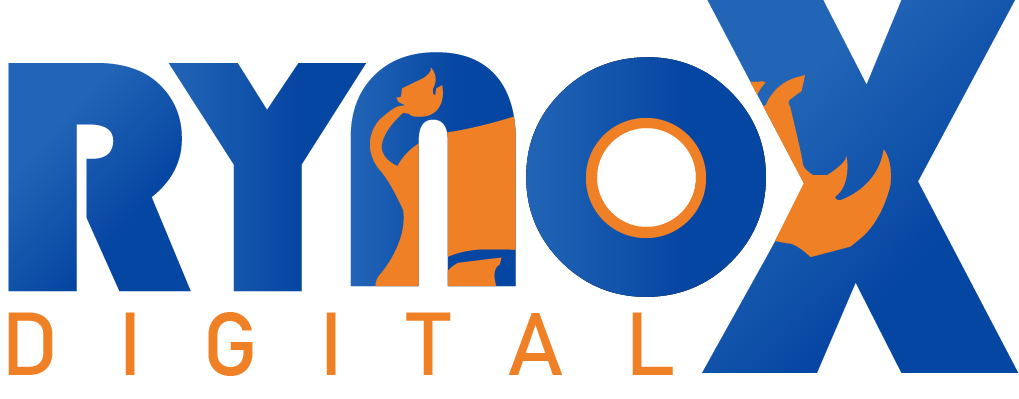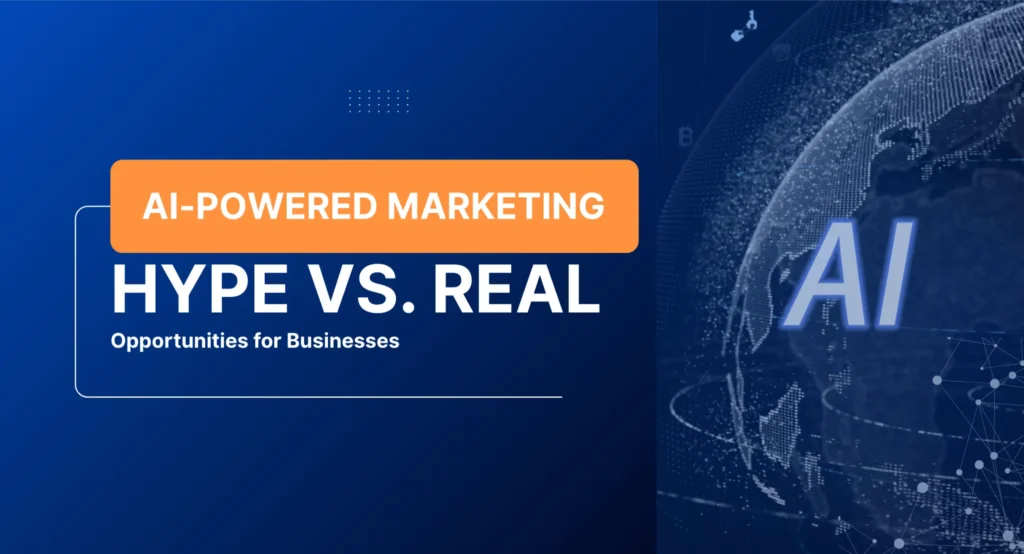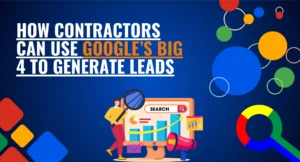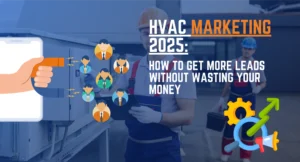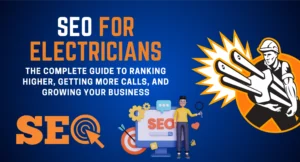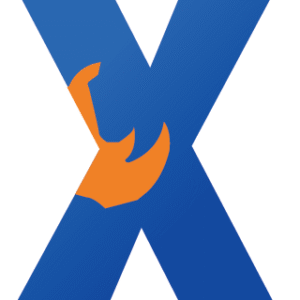Introduction
Artificial intelligence has become one of the most talked-about forces in modern business. Every week, new tools claim they can write your ad copy, design a landing page, generate blog posts, or manage entire marketing campaigns without human involvement. The headlines are loud: “AI will replace marketers,” “AI tools can run your entire digital strategy,” or “AI will do your advertising better than any human ever could.” But how much of this is true?
For business owners, especially in industries like construction where customer trust and project reputation are everything, the rise of AI-powered marketing presents both exciting opportunities and dangerous distractions. Many construction companies are pitched “plug-and-play” AI tools promising to deliver instant results, but most of these solutions fail to address the fundamentals that actually drive leads: a well-designed website, clear service positioning, and strong customer trust signals.
The Hype vs. the Reality
Yes, AI can analyze data faster than humans, suggest keyword strategies, and even write draft blog posts. But AI cannot build trust with a homeowner deciding who to hire for a major remodel, nor can it replicate the authenticity of a contractor showcasing a completed project. The hype around AI-powered marketing often skips this truth: AI is not a replacement for human expertise, strategy, and storytelling — it is a tool that enhances them.
Why Construction Businesses Should Pay Attention
Construction companies face unique marketing challenges. Buyers want reassurance: Has this contractor done work like mine before? Are they local and trustworthy? Do they stand behind their work? AI cannot answer those questions on its own. But it can help construction businesses capture leads more efficiently, optimize ad spend, and streamline communication. For example:
- AI chatbots can answer common questions and book appointments 24/7.
- Predictive analytics can help forecast when demand for roofing or remodeling will spike.
- AI-powered ad platforms can reduce wasted spend by automatically testing different ad variations.
In short, AI can help small and mid-sized construction companies compete more effectively — but only when paired with a strong web design foundation.
The Role of Web Design in AI-Powered Marketing
A mistake many businesses make is investing in AI tools while ignoring their websites. Sending AI-optimized traffic to a slow, outdated site with no clear calls-to-action is like pouring water into a leaky bucket. AI can drive attention, but only a conversion-focused website — fast, mobile-friendly, and rich with testimonials, case studies, and service details — can turn that attention into leads.
What This Blog Will Cover
In this guide, we’ll separate hype from reality in AI-powered marketing. You’ll learn:
- Which AI marketing promises are exaggerated or misleading.
- Real, practical AI opportunities that construction businesses can use today.
- Where AI falls short and why human creativity and trust-building still matter.
- How to combine AI tools with web design to maximize ROI.
- Action steps construction businesses can take right now to implement AI smartly.
The bottom line: AI won’t magically transform your business overnight. But with the right strategy, it can be a powerful addition to your marketing toolbox — helping you save time, reduce wasted spend, and capture more qualified leads.
The Hype Around AI in Marketing
Artificial intelligence has become the buzzword of the decade, especially in the marketing world. Every new tool, software, or startup seems to promise the same thing: that AI will transform your business overnight. And while AI-powered marketing absolutely holds real potential, a lot of what’s being promoted to businesses is overhyped.
The Myth of Total Automation
One of the loudest claims in AI discussions is that marketing can be fully automated. Ads often suggest that with the right AI tool, you can “set it and forget it,” letting machines handle everything from writing blog posts to generating sales leads. For many business owners, especially in industries like construction where they’d rather focus on operations than marketing, this sounds too good to be true. And in most cases, it is.
AI can handle repetitive tasks, analyze patterns, and suggest optimizations, but it cannot replace strategy, positioning, or authenticity. A chatbot may answer questions instantly, but it won’t know the story of a 20-year-old family-owned construction company that takes pride in craftsmanship. AI-generated blog posts might be fast, but without human input, they often lack personality, expertise, or real local context that customers look for.
The “AI Will Replace Marketers” Scare
Another piece of hype is the belief that AI will completely replace marketers, copywriters, or designers. It’s true that AI has changed workflows — it can now generate ideas, drafts, or ad variations much faster than humans. But marketing is more than output. It’s about understanding people, telling stories, and building trust.
In the construction industry, trust is non-negotiable. Homeowners don’t hire contractors because of clever AI-written ads. They hire them because of photos of finished work, testimonials from neighbors, and reassurance that the company is licensed and insured. AI cannot replace these credibility factors — it can only support how they’re communicated.
Shiny Object Syndrome in Small Business Marketing
Many small businesses fall into what’s known as shiny object syndrome. New AI marketing platforms appear, promising dramatic results with minimal effort, and business owners sign up hoping for a quick fix. The problem? They end up with a stack of tools but no strategy tying them together.
For example, a remodeling company might subscribe to an AI copywriting tool, an AI ad manager, and an AI chatbot service, thinking these will boost leads. But without a clear web design foundation (fast website, strong calls-to-action, SEO-ready content), the tools don’t actually generate results. Instead, they create confusion, wasted money, and disappointment.
Why the Construction Industry Is Especially Vulnerable to Hype
Construction companies often don’t have full in-house marketing teams. Marketing tasks are handled by owners, office managers, or part-time staff who may not be trained in digital strategy. That makes them prime targets for overhyped tools.
- A roofing company might buy into an AI SEO tool promising “instant first-page rankings.”
- A general contractor might believe an AI website builder can replace professional design.
- A home improvement business might invest heavily in an AI ad tool but never optimize its landing pages.
In each case, the business spends money without fixing the fundamentals. AI tools amplify what already exists — so if the foundation is weak, the results will still fall short.
The Risk of Generic, Cookie-Cutter Marketing
AI excels at creating outputs quickly, but without human editing, the results often feel generic. If three local painting companies use the same AI to generate blog posts, they’ll likely end up with nearly identical content. That doesn’t help differentiate brands — and it could even hurt search rankings if content becomes too repetitive across sites.
In AI-powered marketing, the risk of “sameness” is real. Businesses that rely exclusively on automation lose the unique voice and local credibility that customers value. In construction, where every project has unique photos, customer stories, and challenges, cookie-cutter marketing is a dealbreaker.
What Businesses Need to Remember
AI is not magic. It is a tool. The hype often ignores a critical truth: AI-powered marketing only works when combined with human strategy, creativity, and industry expertise.
- AI cannot define your target market — only you know which neighborhoods, project sizes, or customer types matter.
- AI cannot prove your credibility — only real testimonials, reviews, and case studies can do that.
- AI cannot close deals — only human sales conversations can convert leads into contracts.
Businesses — especially in construction — must resist the hype and instead view AI as a support system for marketing. The real power comes when AI is integrated into a larger digital strategy, built on web design, SEO, and authentic brand storytelling.
Real Opportunities of AI-Powered Marketing
While much of the buzz around AI is overblown, there are areas where AI-powered marketing provides real, measurable opportunities for businesses. For construction companies and service-based industries, the key is to focus on tools that directly support lead generation, customer engagement, and efficiency. When used strategically, AI can reduce wasted time, optimize marketing spend, and increase conversions — but only if paired with strong web design and a clear strategy.
1. AI Chatbots for Faster Customer Engagement
One of the biggest advantages of AI in marketing is the ability to provide instant responses. In construction, potential clients often visit a website with simple but urgent questions:
- “Do you offer free quotes?”
- “Are you available in my area?”
- “What’s your typical project timeline?”
An AI chatbot, embedded on a construction company’s website, can answer these questions 24/7. It ensures no lead is left waiting, even outside office hours. For small businesses where the owner can’t always answer the phone, this feature is invaluable.
SEO Connection: A well-integrated chatbot can also boost AI-powered marketing results by guiding visitors to the right service page, increasing time on site, and reducing bounce rates — all of which improve search visibility.
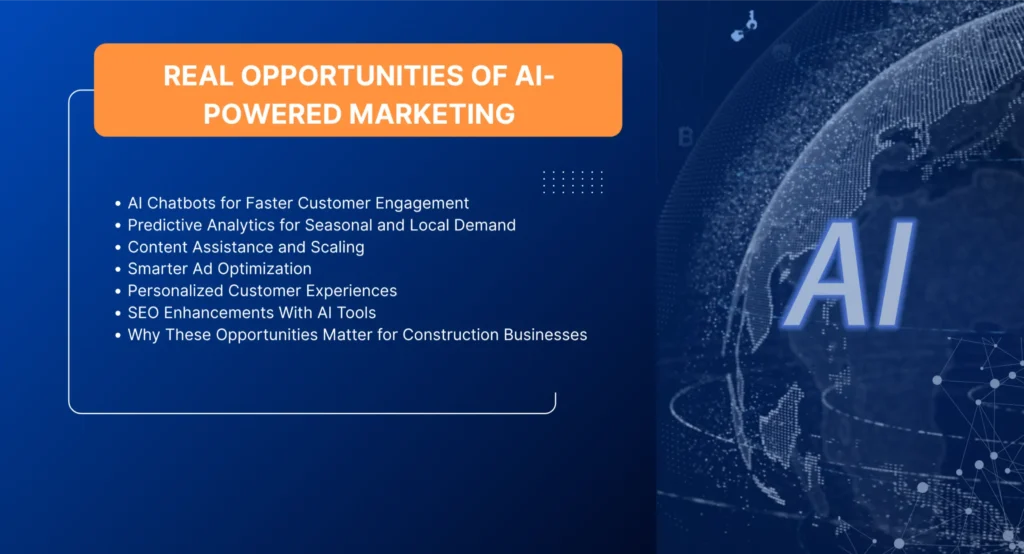
2. Predictive Analytics for Seasonal and Local Demand
Construction demand often follows seasonal patterns. Roofing companies see spikes after storms, remodeling businesses peak during summer, and window installers get more calls before winter. Traditionally, these patterns were tracked manually or guessed.
With AI-driven predictive analytics, businesses can analyze past customer data, weather reports, and local trends to forecast demand. This allows construction companies to adjust ad budgets, create timely promotions, and prepare resources ahead of peak periods.
For example, instead of running ads year-round with equal spend, an AI platform might identify that “roof repair” searches rise by 45% in a particular county in March. This means you can allocate more budget during that window for maximum ROI.
3. Content Assistance and Scaling
Maintaining a consistent content pipeline — blogs, service pages, and FAQs — is tough for construction businesses. AI tools can help generate first drafts of content that humans can refine. This accelerates production and ensures businesses stay active online, a critical factor in SEO rankings.
For example:
- A contractor can use AI to draft a blog titled “5 Signs Your Home Needs New Windows”.
- A remodeling firm can generate FAQs for “kitchen remodeling timelines” or “permit requirements in Houston.”
- A painting company can build landing pages for “commercial painting services” with AI assistance.
The human team then edits these drafts with real project insights, photos, and local expertise — ensuring the content is unique and trustworthy.
4. Smarter Ad Optimization
Advertising platforms like Google Ads and Facebook Ads already use AI to test ad variations, but with AI-powered marketing, small businesses can take this further. AI can identify the best-performing headlines, adjust targeting in real time, and even predict which leads are more likely to convert.
For construction businesses, this means:
- Less money wasted on irrelevant clicks.
- More focus on high-intent searches like “bathroom remodeling near me” instead of broad keywords like “remodeling.”
- Automated adjustments that maximize conversions without constant manual monitoring.
When combined with optimized construction web design, ads become far more effective. Visitors land on clean, persuasive pages with clear calls-to-action, turning clicks into real inquiries.
5. Personalized Customer Experiences
AI can personalize website experiences based on user behavior. For example, if someone visits a remodeling contractor’s site and browses the “kitchen remodeling” page, AI tools can recommend related blog posts, galleries, or even display testimonials specific to kitchen projects.
This kind of personalization helps customers feel understood and increases the chance they’ll take action. It also improves engagement metrics like page views and session duration, boosting SEO in the process.
6. SEO Enhancements With AI Tools
SEO is critical for construction businesses, but it’s often overlooked. AI tools like Surfer SEO, Clearscope, or MarketMuse analyze competitors, identify keyword gaps, and suggest improvements. For example:
- A window installer could discover keywords like “energy-efficient windows Houston” and create content around it.
- A roofing company could optimize titles and meta descriptions for local storm repair services.
These tools don’t replace strategy but give businesses a data-driven edge, making AI-powered marketing more precise.
Why These Opportunities Matter for Construction Businesses
Unlike hype-driven AI tools, the opportunities listed above directly impact lead flow, visibility, and efficiency. They help construction businesses:
- Respond faster to inquiries.
- Allocate marketing budgets more intelligently.
- Publish content consistently.
- Improve ad ROI.
- Build trust with personalization.
The difference is simple: AI should enhance existing marketing efforts, not replace the fundamentals. Without a strong website, clear service pages, and authentic customer reviews, even the smartest AI cannot deliver meaningful results.
Where AI Falls Short
AI tools are powerful, but they’re not magic. For every business that sees success using AI-powered marketing, there are others that become frustrated when results don’t meet expectations. The truth is that while AI is great at automation, prediction, and pattern recognition, it has significant limitations. Ignoring these shortcomings often leads to wasted budgets and marketing campaigns that feel impersonal or ineffective.
1. Lack of Human Creativity and Emotional Connection
AI can generate content, but it can’t replicate authentic human creativity. In construction marketing, this is a major issue. Homeowners aren’t just buying a service — they’re making an emotional decision about who to trust with their home.
- A remodeling company’s blog needs to show empathy for the stress of living through renovations.
- A roofing contractor’s testimonial page must highlight real customer stories about storm damage and repair.
- A painting company’s portfolio needs before-and-after photos that tell a visual story.
AI-generated copy may sound polished, but it lacks the emotional nuance and storytelling that builds trust. This is one of the biggest reasons AI-powered marketing cannot fully replace human marketers.
2. Over-Reliance Leads to Generic Content
Another drawback of AI in digital marketing is its tendency to create generic, cookie-cutter material. If three local construction companies use the same AI tool to generate a blog about “benefits of energy-efficient windows,” the posts will be nearly identical.
This creates two problems:
- Customers can’t differentiate between brands.
- Google may penalize sites with repetitive or duplicate content.
For industries like construction — where local trust and credibility are everything — standing out is critical. Businesses that rely solely on AI risk blending into the noise instead of building authority.
3. Limited Understanding of Context and Nuance
AI tools process data, but they don’t truly understand context. For example:
- An AI might generate an ad for “cheap contractors near me,” not realizing the negative connotation “cheap” carries in construction.
- It might write a service description promising “instant remodeling results,” which sets unrealistic expectations.
Human oversight is essential to catch these errors. Without it, AI-powered marketing campaigns may misrepresent a business or harm its reputation.
4. Strategy Still Requires Human Insight
AI can optimize pieces of a campaign — ad bids, keyword placement, or email timing — but it cannot develop a full marketing strategy. Strategic decisions require understanding the competitive landscape, pricing models, service profitability, and customer behavior.
For example:
- Should a general contractor invest more in bathroom remodel campaigns or whole-house projects?
- Is it smarter to target luxury homeowners or middle-income families in a specific suburb?
- How should marketing align with seasonal demand and staffing availability?
These questions require human judgment. AI provides data, but strategy is still human-driven.
5. Risk of Damaging Customer Trust
Trust is everything in construction. If customers feel they are talking to a bot instead of a real person, it may weaken confidence. While chatbots are useful for FAQs, they should never fully replace human interaction.
Imagine a homeowner dealing with storm damage who wants immediate reassurance. If all they get is canned responses from a chatbot, they may leave and call a competitor who picks up the phone. AI-powered marketing must always balance automation with genuine, human interaction.
6. Ethical and Data Privacy Concerns
AI often relies on collecting large amounts of customer data. But mishandling this information can create privacy issues or compliance problems. For small businesses without dedicated IT teams, this can be risky. A single misstep — such as mishandling location data or failing to disclose chatbot use — could harm customer relationships and even lead to penalties.
Why Recognizing These Limits Matters
Understanding where AI falls short doesn’t mean businesses shouldn’t use it. It means they should use it strategically. By knowing its weaknesses, construction businesses can:
- Avoid over-reliance on AI for content creation.
- Ensure human oversight keeps messaging authentic and credible.
- Use AI as a supporting tool instead of a replacement for creativity or strategy.
In short, AI-powered marketing is like adding power tools to your toolkit. A nail gun makes the job faster, but it doesn’t replace the skill of a carpenter. The real results come from combining technology with human expertise.
Actionable AI Opportunities for Construction Businesses
It’s one thing to talk about what AI can do in theory, and another to see where it delivers real results for specific industries. For construction companies — general contractors, roofers, remodelers, painters, window installers — the goal is simple: generate qualified leads, build trust, and convert inquiries into paying jobs. Used smartly, AI-powered marketing can support those goals. Below are practical, actionable opportunities construction businesses can start using today.
1. AI Chatbots That Convert Inquiries Into Leads
Potential customers often visit a construction website with questions like:
- “Do you serve my zip code?”
- “How soon can I get a quote?”
- “Do you handle insurance claims?”
An AI chatbot, integrated into your site, can answer these instantly, collect contact details, and even schedule calls or site visits. For small businesses that don’t have full-time office staff, this ensures no lead is left unattended.
The trick is to design the chatbot to support, not replace, human contact. For example, it should answer simple FAQs but quickly pass serious inquiries to a real person. This balance keeps customers engaged without sacrificing trust.
2. AI-Assisted Content Creation for Service Pages and Blogs
Keeping a website updated with fresh content is key for SEO. But construction owners rarely have time to write detailed blog posts or service descriptions. AI tools can help generate first drafts of:
- Local landing pages (e.g., “Roof Repair in Dallas, TX”).
- Blog posts (e.g., “5 Signs It’s Time to Replace Your Windows”).
- FAQ pages addressing common homeowner concerns.
The important step is human editing. Adding real project photos, customer testimonials, and local knowledge makes the content unique and credible. AI does the heavy lifting of structuring and drafting, while humans provide authenticity. This combination makes AI-powered marketing efficient and trustworthy.
3. Smarter Local Advertising With AI Optimization
Google Ads and Facebook Ads already use AI in the background, but contractors can push this further by using AI to refine campaigns. Benefits include:
- Automatically adjusting bids to focus on high-intent keywords like “emergency roof repair near me.”
- Testing dozens of ad headlines and visuals to find what gets the most clicks.
- Predicting which ad combinations generate actual phone calls, not just impressions.
When paired with optimized construction web design (fast, mobile-friendly landing pages with strong CTAs), AI-powered ad optimization helps stretch budgets and bring in higher-quality leads.
4. AI for Predictive Demand Planning
Construction demand fluctuates — storm repair spikes after bad weather, remodeling increases during spring and summer, and insulation companies get busy before winter. AI can analyze data like local weather trends, search patterns, and historical demand to predict when inquiries will rise.
This means a roofing contractor can increase ad spend right before storm season, or a remodeling firm can plan promotions around times when homeowners typically invest in upgrades. Predictive insights make AI-powered marketing smarter and more profitable.
5. Personalization on Construction Websites
AI tools can personalize a visitor’s website experience. For example:
- If a visitor browses “kitchen remodeling,” the site can highlight related case studies and testimonials.
- If someone visits from a certain city, the site can display localized project galleries or customer reviews from that area.
This type of personalization helps potential clients feel understood and increases the chance they’ll request a quote. It also improves user engagement metrics, which boosts SEO rankings.
6. Reputation and Review Monitoring With AI
Online reviews are a major ranking factor in local SEO and a big part of a construction company’s reputation. AI-powered review monitoring tools can:
- Alert you instantly when a new review is posted.
- Analyze sentiment to identify recurring issues.
- Automate polite follow-ups to request reviews from happy clients.
This not only protects your reputation but also feeds into better search visibility. A steady stream of positive reviews strengthens both trust and rankings.
7. Automating Routine Marketing Tasks
AI can streamline repetitive marketing work:
- Generating monthly performance reports.
- Scheduling social media posts across platforms.
- Organizing lead data and syncing it with CRM systems.
By automating these back-office tasks, business owners and marketers can spend more time focusing on customer relationships and project delivery.
Why These Opportunities Work
The beauty of these opportunities is that they directly support business growth. They don’t just look good on paper; they address real challenges construction companies face every day: missed calls, inconsistent content, wasted ad spend, and lack of visibility. When implemented correctly, AI-powered marketing becomes a practical toolkit for generating leads, saving time, and improving ROI.
The Future of AI-Powered Marketing
AI has already changed the way businesses approach digital strategy, but we’re only scratching the surface. As the technology matures, AI-powered marketing will become more integrated, personalized, and essential to how companies — including those in construction — attract and retain customers. Looking ahead, several trends stand out that will define the future of AI in marketing.
1. Hyper-Personalization Will Become Standard
Today, personalization means showing a customer their first name in an email or suggesting services based on browsing history. In the future, AI will take personalization to an entirely new level. For example, a construction company’s website could adapt its content dynamically:
- A homeowner interested in window replacement might immediately see galleries of past window projects in their area.
- A visitor browsing “roof repair” could see storm damage case studies relevant to their zip code.
This level of personalization makes prospects feel understood, increasing trust and improving conversion rates. The future of AI-powered marketing will be about creating one-to-one experiences at scale.
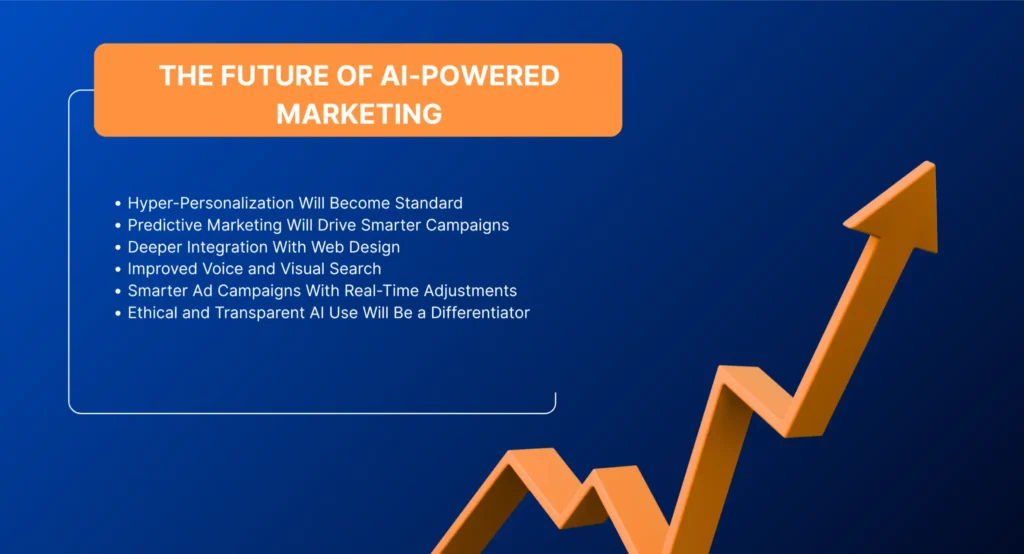
2. Predictive Marketing Will Drive Smarter Campaigns
Currently, most marketing is reactive — businesses respond to search demand, inquiries, or seasonal spikes. AI is evolving to make predictive marketing more accessible. By analyzing past project trends, weather data, and search behavior, AI tools will predict when customers are most likely to need services.
For construction companies, this means being able to anticipate demand:
- Roofing contractors could prepare campaigns ahead of storm season.
- Remodelers might identify neighborhoods with older homes due for upgrades.
- Window installers could target ads before winter when energy efficiency becomes a concern.
Predictive marketing ensures businesses reach customers before competitors even realize the demand exists.
3. Deeper Integration With Web Design
The future of AI-powered marketing will rely heavily on how well it integrates with web design. Websites will no longer just be digital brochures; they will become interactive, intelligent platforms that adapt in real time.
For example:
- Smart contact forms that pre-fill based on visitor data.
- AI-driven recommendation engines that suggest blog posts, services, or galleries tailored to each visitor.
- Websites that adjust messaging depending on whether the visitor is a new lead, a repeat visitor, or a returning customer.
For construction companies, this means turning their sites into lead generation hubs that are smarter and more engaging than competitors’.
4. Improved Voice and Visual Search
Voice search is already transforming SEO, and AI will push it further. Homeowners will increasingly ask assistants like Alexa or Google, “Who’s the best remodeling contractor near me?” Businesses with AI-optimized sites will be more likely to show up in those results.
Visual search will also rise. Imagine a homeowner uploading a picture of a damaged window or roof and AI suggesting local contractors who can fix it. Companies that optimize their sites with images, alt text, and structured data will be well positioned to capture these opportunities.
5. Smarter Ad Campaigns With Real-Time Adjustments
Future advertising won’t just optimize after campaigns launch — it will adjust in real time. AI will not only test ad variations but also shift budgets instantly toward the highest-performing keywords, regions, and platforms.
For construction businesses, this means no more wasted spend on irrelevant clicks. Budgets will automatically focus on the neighborhoods, services, and customer segments most likely to convert.
6. Ethical and Transparent AI Use Will Be a Differentiator
As AI becomes more powerful, transparency will be vital. Customers don’t want to feel misled by bots or impersonal automation. Companies that are upfront — using AI responsibly while keeping human contact at the core — will stand out. For industries like construction, where trust is the foundation of every deal, balancing AI efficiency with human authenticity will be non-negotiable.
Preparing for the Future Today
The businesses that win in the future of AI-powered marketing won’t be those that chase every new tool. They’ll be the ones that build a strong foundation now — with conversion-focused web design, authentic content, and consistent branding — and then layer AI on top to amplify results. By starting early, construction businesses can gradually adopt AI-driven features, test what works, and stay ahead of competitors who wait until it’s too late.
Conclusion: Balancing Hype and Opportunity in AI-Powered Marketing
The rise of AI has brought both excitement and confusion. Every business owner is hearing about the promise of automation, prediction, and personalization. Yet the reality is clear: while AI-powered marketing is not a silver bullet, it can be a powerful addition to your toolkit when used strategically.
For industries like construction, where trust, reputation, and craftsmanship are everything, AI cannot replace the human touch. It cannot showcase the pride of a completed remodel, the reliability of a roofing team, or the story behind decades of experience. What it can do, however, is make marketing smarter, faster, and more efficient. From AI chatbots that capture leads instantly to predictive analytics that identify when demand will spike, the opportunities are real — but only if paired with fundamentals like strong web design, authentic content, and transparent customer communication.
The Key Takeaway
Businesses that treat AI as a shortcut will likely be disappointed. Those that use it as a support system, layered on top of a clear strategy and conversion-ready website, will see the best results. Think of AI as the power tool that helps you complete jobs faster and more efficiently — but still requires the skill of the craftsman behind it.
Why Construction Businesses Should Act Now
AI is evolving quickly, and early adopters who implement the right tools today will have a competitive advantage tomorrow. By the time competitors scramble to catch up, businesses already using AI-powered marketing will have stronger visibility, more reviews, smarter ad campaigns, and deeper connections with their ideal customers.
Your Next Step
At Rynox Digital, we specialize in helping construction companies cut through the noise and use technology in ways that actually drive results. We don’t believe in chasing hype — we believe in pairing practical AI tools with high-performing websites and proven marketing strategies.
If you want your business to stay ahead in an increasingly digital marketplace, now is the time to act.
Ready to grow your construction business?
Schedule a free consultation with RYNOX DIGITAL today and see how AI-powered marketing, combined with expert web design, can help you generate more leads and win more projects.
